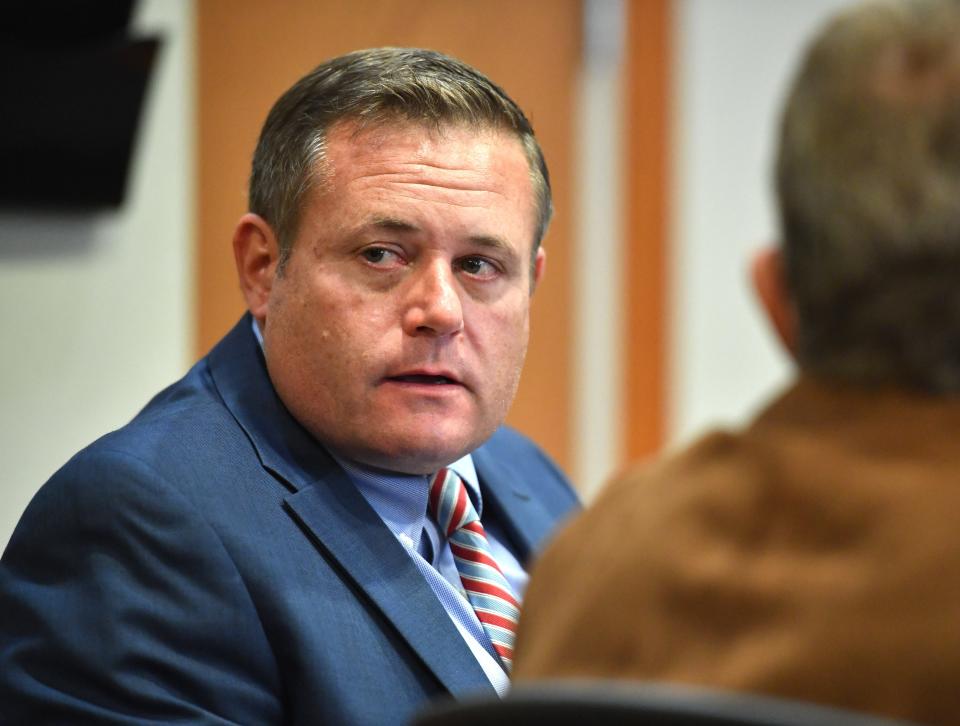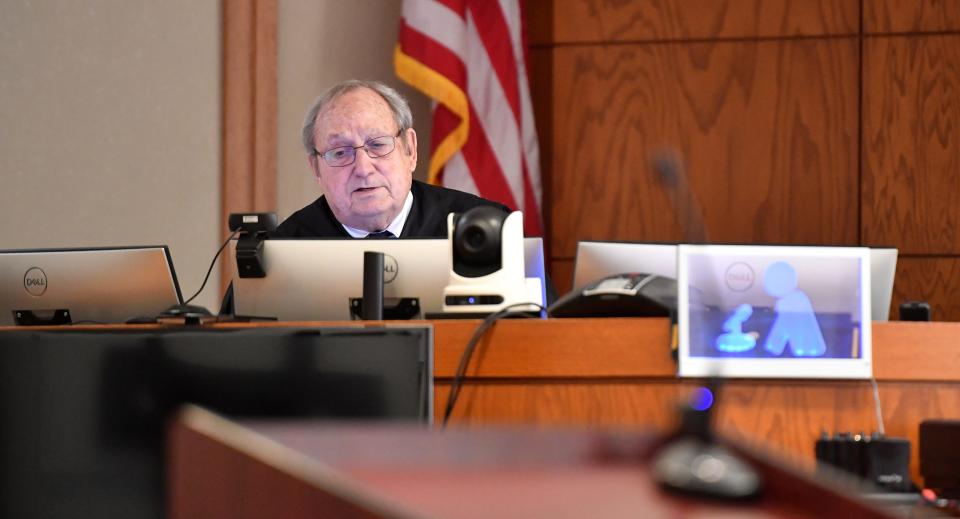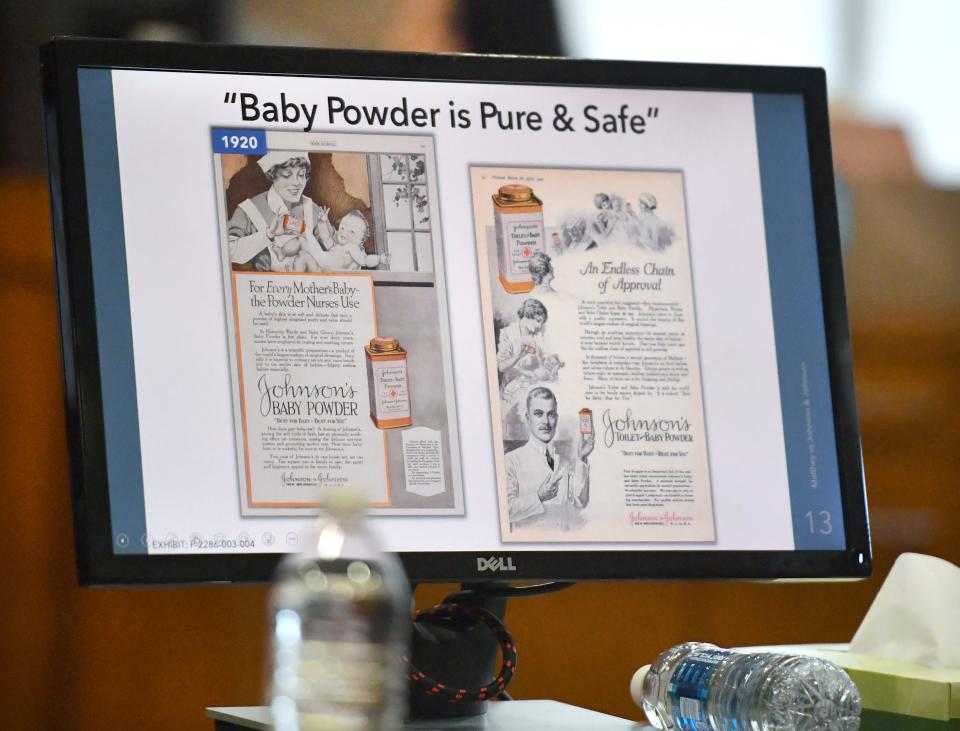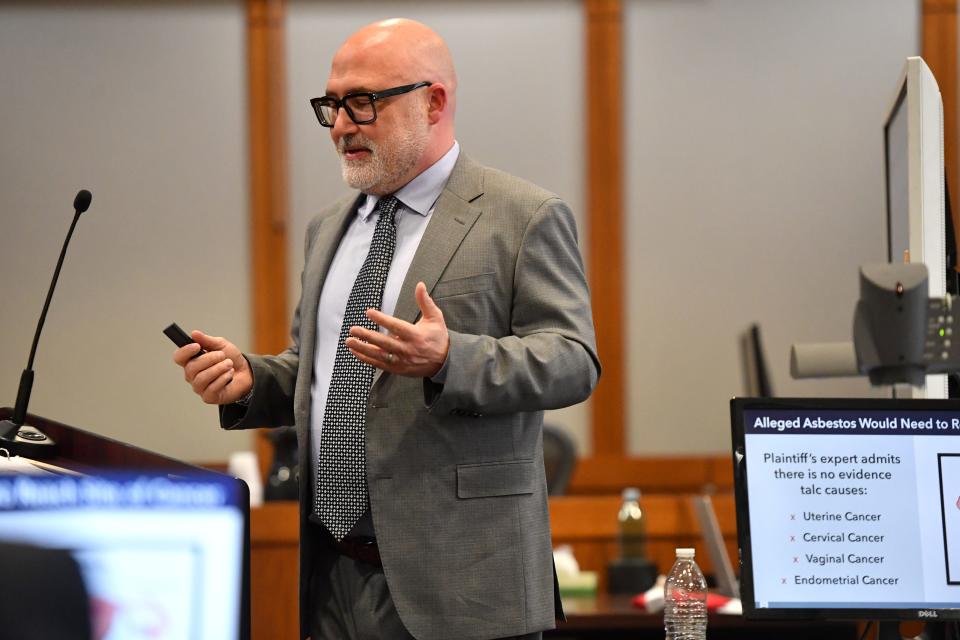Sarasota jury hears opening statements in wrongful death trial against Johnson & Johnson

Attorneys for a Sarasota County family and Johnson & Johnson addressed on Monday what evidence they believed would be presented during a three-week trial related to whether talc-based baby powder is associated with causing ovarian cancer.
The family of Patricia Matthey is suing pharmaceutical and medical technology company Johnson & Johnson for product liability and wrongful death.
In August 2016, Pat Matthey was diagnosed with ovarian cancer. A little over two years later, she filed her lawsuit in Sarasota County, where she was a resident, alleging that her cancer was linked to the talc-based baby powder produced by Johnson & Johnson which she had used for more than 50 years.
In the news: Florida Supreme Court signs off on abortion rights amendment for November ballot
More court news: Live updates and reaction: Recreational marijuana amendment approved for Florida ballot

Patricia Matthey, 72, died in November 2019 after a long and painful battle with Stage 4 ovarian cancer, according to attorney Lance Oliver. Her son, Philippe Matthey, is suing on behalf of his mother’s estate for more than $30,000.
Philippe Matthey sat on the edge of the plaintiff’s table Monday next to his father, Bernard Matthey, who was by his wife's side throughout her fight with cancer.
Over the decades, there have been varied opinions from scientists, researchers and government agencies about whether talc-based powders increased the risk of ovarian cancer in women.
Talcum, or talc, is a soft, naturally occurring mineral mainly made up of magnesium, silicon and oxygen, and is often found in mines with asbestos.
Judge Lee E. Haworth, who retired in 2015 but occasionally presides over trials to assist with caseloads, will oversee the trial for Sarasota Circuit Court Judge Hunter Carroll. He informed both parties that Carroll had ruled on several orders, including that punitive damages would not come into play in this case.
The attorneys also informed Haworth that three counts were no longer a part of the complaint including the breach of express warranty, breach of implied warranty and a violation of Florida's Deceptive and Unfair Trade Practices Act.

Attorney for plaintiffs: Company lied to consumers for over 50 years
"Baby powder is pure and safe." "Best for Baby - Best for You." "If it's good enough for the whole world."
These were some of the Johnson & Johnson advertisements about baby powder from the 1920s that Oliver, attorney from Motley Rice LLC representing the family, showed the jury during his opening.
"You may have walked into the courtroom last week wondering, 'How does one of the most trusted baby product companies end up in a courtroom like this accused of something,'" Oliver said.
The answer: the company exploited the trust of consumers and put wealth over women again, and again, and again, Oliver said.
In other court news: Man found guilty of attempted murder connected to 2022 Ellenton Premium Outlets shooting
More: Sarasota city attorney recommends Arroyo abstain from future Ken Thompson Park votes
He added that the evidence he and his team intend to present during the trial will prove that Johnson and Johnson knew and hid the fact since the 1950s that there was asbestos in their product and that the baby powder was linked to cancer; that the company tried to get the asbestos out of the product but when it failed, they would claim it was a mistake or product contamination.
Above all, Oliver said that the company lied to consumers for more than 50 years.
While Patricia Matthey can't testify before the jury, the jury will hear from her through video depositions taken before she died. Oliver said that in the depositions, Pat Matthey said she recalled the advertisements for "Anybody's Baby" and how the baby powder was marketed at young women like her to make them feel like "good, clean" people.

Oliver said over the next two to three weeks, the jury would learn about how throughout her adult life, Pat Matthey used Johnson & Johnson's baby powder as a deodorant and antiperspirant on her genital area. And how that powder eventually found its way into her ovaries, attacking the tissue and forming cancerous cells which would eventually lead to her death following extensive surgeries and chemotherapy.
The jury is expected to hear from experts who will present studies and evidence linking talcum powder to increased risk of ovarian cancer and will see internal records from Johnson & Johnson that showed the company had failed to warn consumers since the 1960s of the risks despite knowing about them, according to Oliver.
One expert, Dr. Roberta Ness will walk the jury through causation, specifically how it is that scientists know that baby powder causes cancer based on studies performed by various researchers over 40 years to women of all demographics.
Another expert will walk the jury through Pat Matthey's medical history, showing the risk and protective factors associated with cancer, while a third expert will show the jury his findings when he broke down a preserved tissue sample from Pat Matthey that reveals that there were talc particles in her tissue.
Oliver urged the jury to consider three questions at the end of the trial: Who's telling the truth? What does common sense tell you? What's the right thing to do?
"I don't get to do justice, I don't," Oliver said. "I get to present my client's case, but only you all can determine what the right thing to do is and when you see this evidence, I'm confident that you're going to determine that the right thing to do is find for my clients in this case."
"Association" does not mean "Causation": Defense aims to prove no link between talc-powder and ovarian cancer
Morton Dubin, on behalf of Johnson & Johnson, urged the jury to wait until they heard all the evidence so that they could use them as a road map to understand the whole picture.
Dubin said the case is about science and comes down to whether the plaintiffs are right or wrong about talc and about what caused Pat Matthey's cancer.
"No one is disputing that what the Matthey family went through, what Pat Matthey went through, was horrendous. It was a terrible experience," Dubin said.
Study: No strong link between baby powder and cancer, study finds
Appeals court: No new trial in Venice discrimination case levied by Black officer
In case you missed it: Sarasota litigation attorney appointed to County Court position in 12th Judicial Circuit
The evidence the defense expects to present will show that there is no vast conspiracy among cosmetic companies, including Johnson & Johnson, to hide that cosmetic talcum powder causes ovarian cancer, Dubin said. Instead, the defense will present studies done by public health agencies like the American Cancer Society and National Cancer Institute that indicate that cosmetic talc doesn't cause cancer.
"When you hear about Johnson & Johnson saying that they don't think talc causes ovarian cancer or they think that their product is safe, the reason why they said that, the reason why they believe that, is based on the science and opinions of the medical community," Dubin said.
Dubin asked that jurors look at the methodology used behind the studies, touching on the two different types of methodologies used in the studies: cohort studies, which are forward-looking and have some of the strongest evidence, and backward-looking case-control studies, which he indicated are more susceptible to biases like recall bias, confoundment and chance.

Dubin pointed out that there will be inconsistencies in the plaintiffs' case. Dubin added he doesn't believe that the attorneys for the plaintiffs will get close to proving that if Pat Matthey hadn't used talc, she wouldn't have gotten cancer because of her increased risk factors like her age and a family history of breast cancer.
"I just implore you to try to keep an open mind, to give us some time to both ask them questions about things and then put our own witnesses in before you make up your minds," Dubin said.
Gabriela Szymanowska covers the legal system for the Herald-Tribune in partnership with Report for America. You can support her work with a tax-deductible donation to Report for America. Contact Gabriela Szymanowska at gszymanowska@gannett.com, or on X: @GabrielaSzyman3.
This article originally appeared on Sarasota Herald-Tribune: Sarasota jury hears opening statements in Johnson & Johnson civil case

